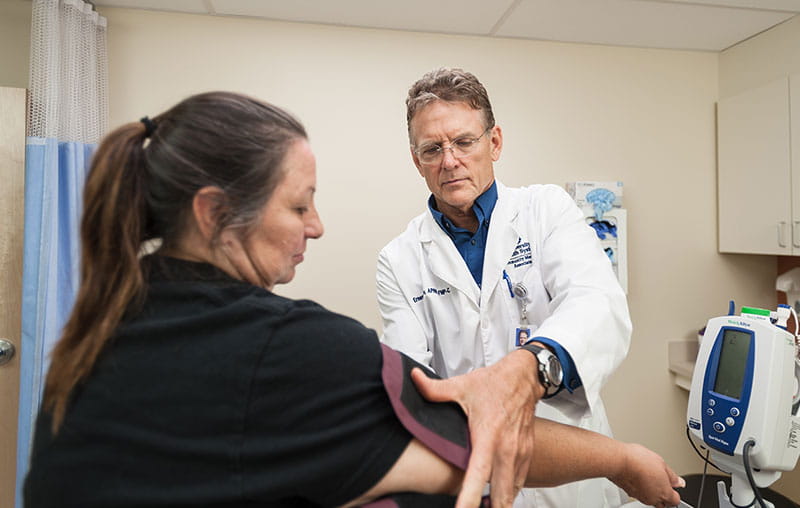Cancer Screening and Prevention
Cancer is a disease in which cells in the body grow out of control. Cancer screenings include checking your body for cancer before symptoms develop. Regular screenings with a primary care provider may detect breast, cervical, lung, colorectal and other cancers early when treatment is most likely to work best.
Screening Tests
Breast cancer
Mammograms and breast magnetic resonance imaging (MRI) are common breast cancer screening tests.
Cervical cancer
- HPV (human papillomavirus) is a virus that can cause some cancers, including cervical cancer
- HPV tests look for cell changes on the cervix that cause pre-cancer and cancers of the cervix
- Pap smears look for pre-cancer cell changes on the cervix that may become cervical cancer if not treated
Colorectal cancer
- Colonoscopy shows the walls of the colon
- Stool screening tests
- Flexible sigmoidoscopy checks for polyps or cancer inside the rectum and lower third of the colon
- CT colonography uses X-rays to produce images of the entire colon
Lung cancer
Your doctor may recommend a low-dose computed tomography (LDCT) lung scan if you smoke or used to smoke.
Screening Recommendations
Ask your primary care provider about the right screening schedule for you based on your age, sex, lifestyle and personal and family health history. The following guidelines are general recommendations.
Breast Cancer
Mammograms are recommended for women 40-74 years old who are at average risk for breast cancer. According to the American Cancer Society:
- Women ages 40-54 should be screened annually.
- Women 55 and older may transition to screenings every other year.
Cervical Cancer
Women ages 21-29 should receive Pap smears every three years. HPV testing isn’t required for women in this age group.
Women 30-65 years old should consult with a doctor about testing options available:
- After an HPV test shows normal results, you may wait five years before the next screening
- After a Pap test shows normal results, you can wait three years before the next screening
If you’re over 65, consult your doctor about screening for cervical cancer.
HPV Vaccine
Anyone can get the HPV vaccine. Children can get their first dose at age 9, and a second dose 6-12 months later. However, if a child does not start the initial dose at age 9 and they have reached age 15 or older at the time of their first dose, they will need three doses instead of two when started at a younger age.
Colorectal Cancer
Colorectal screening is recommended for adults 45-75 years of age. If you’re at an increased risk of colorectal cancer, your doctor may suggest you begin screening earlier. Screening frequency depends on personal risk factors and the type of test used.
Lung Cancer
Lung cancer screenings are recommended for adults at high risk of developing the disease due to smoking history and age. You should receive a yearly lung screening using a low dose of radiation if you meet all of these criteria:
- Between the ages of 50-80
- Current smoker or former smoker who quit in the past 15 years
- Have a 20-pack-year history of smoking (A pack-year is equal to smoking a pack of cigarettes daily for one year. In other words, smoking a pack a day for 20 years equals 20 pack-years. Smoking two packs a day for 10 years also equals 20 pack-years.)
Cancer Risk Factors
According to the National Cancer Institute, risk factors for cancer are:
- Older age
- Excessive alcohol consumption
- Chronic inflammation due to infection
- Exposure to cancer-causing substances such as radiation, sunlight and tobacco smoke
- Family history of cancer
- Immunosuppression due to medications or certain infections
- Obesity
Some of these risk factors are preventable. Limiting your exposure to them may lower your risk of developing certain cancers.
Cancer Screening Rates in Bexar County
The following information about Bexar County residents comes from a 2015-2020 survey led by the Texas Behavioral Risk Factor Surveillance System.
| Health Condition | Screening Rates | Geographic Differences | Ethnic Differences |
| Breast Cancer | 1 in 4 women aged 50+ reported having a mammogram in the past year |
Near Northside: |
Black (non-Hispanic) women were less likely to have had a mammogram than white, Hispanic and other ethnic groups |
| Cervical Cancer | 75% of women aged 21+ reported having had a Pap test |
Northeast Side: |
University Health Resources
University Health and our community partners can help you and your family identify your cancer risk or detect the disease early, when treatment works best.
Primary Care
Primary care providers at University Health can screen for various conditions including cancer.
Cancer Risk Assessments
University Health’s cancer screening and prevention program offers comprehensive cancer risk assessments and risk-reduction strategies for individuals with a higher risk of cancer due to hereditary or genetic factors.
Smoking Cessation
If smoking is a habit you’d like to stop, University Health can help. Our smoking cessation program and Texas’ Yes Quit program offer you support and encouragement when you’re ready to break the hold cigarettes have on your life, breathe easier and live healthier.
GetFIT (Colorectal Cancer Prevention Program)
The GetFIT program aims to increase cancer prevention by providing colorectal cancer screenings and early detection for adults between the ages of 45-75. You must have a FIT test order from a primary care provider to qualify.
Gilead Focus Program
Gilead Focus provides adults ages 18 and older routine screening for HIV in the emergency department and HIV, Hepatitis C, and Hepatitis B screening in ambulatory clinics. If patients receive a positive result, a member of our team will link patients to treatment. Please call 210-358-6507 for more information.
Hep C – CARE (Colonias Advancing & Restoring Esperanza)
This program aims to reduce rates of liver cancer by screening for and vaccinating against Hepatitis C. The program provides patient and provider education and culturally tailored patient navigation services in the Middle Rio Grande Border Region. The main goal of the program is to reduce health disparities experienced by predominantly rural and medically underserved communities.
Healthy Texas Women
Healthy Texas Women helps women receive screenings if they’re uninsured or underinsured and meet certain income restrictions.
Community Resources
ThriveWell
The ThriveWell Foundation is dedicated to empowering cancer patients to live healthier, fuller lives. Through their Diva and Dude program, they offer free exercise, nutrition and wellness classes tailored for both men and women cancer survivors. In addition, the foundation supports eligible adult cancer patients by providing financial assistance for treatment co-pays, as well as transportation help for medical appointments.
The Susan G. Komen Access Project
The Susan G. Komen Access Project aims to reduce barriers to care by funding the screening mammogram, providing wrap-around care with other funding, assigning navigators to the client process, minimizing required paperwork and making mobile mammography buses available in multiple locations.
WINGS (Women Involved in Nurturing, Giving, Sharing)
WINGS provides breast health services to women in Central and South Texas. If you have been diagnosed with breast cancer, you are not covered by any insurance carrier, Medicare or other third-party payer and you meet certain financial requirements, you may be eligible to apply for WINGS. Please call 210-946-9464 for more information.
Every Body Texas
This project provides breast and cervical cancer screenings for low-income or uninsured women. Find a clinic to access care.



